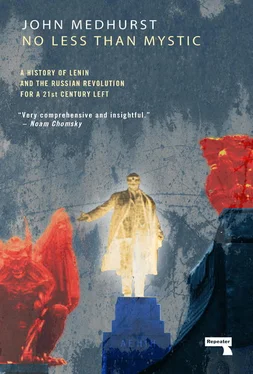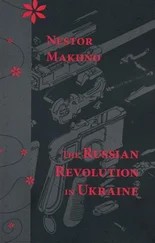Lenin’s defenders argue that the corruption of the revolution arose from the intolerable pressure of external events. But significant though these were, I would argue that the primary causative factor was the inherent logic of Leninism. Once certain precepts central to Lenin’s vision of socialism–i.e. the leading role of a vanguard of professional revolutionaries who represent the advanced working class; contempt for “formal” democracy; disregard for universal civil rights and cultural freedoms; and acceptance of temporary repression during transition to a future utopia–were accepted, then the larger goal of liberation was already and inevitably lost.
Many on the left who make confident references to the Russian Revolution in political discussion, social-media debate etc., are often much less informed on the subject than they suppose. 1Part of the reason for this is the simplistic bias of most primers and summaries. There is a need for a new history, unambiguously of the left, that nevertheless rises above the old dichotomies and stereotypes. The Marxist historian Christopher Hill opened his superb history of Britain in the 17th century, The Century of Revolution 1603-1714 (1961), with the statement: “History is not a narrative of events. The historian’s difficult task is to explain what happened”. 2This is true up to a point, although these are not mutually exclusive. A proper accounting of “what happened” requires a fusion of narrative and explanation.
This book has the surface format of a narrative history, but it interweaves explanation–social, political, cultural–within the narrative to broaden understanding of what occurred and why. It is not a work of Marxist historiography, although it utilises Marxist economic categories where they are useful. I do not offer a grand theoretical synthesis, being naturally sceptical of such things, although woven into the commentary and conclusion are observations on socialist strategy and suggestions for what Paul Mason has called “revolutionary reformism”. Its final conclusion, presented with as much fealty to the historical evidence as I can summon, is that the legacy of Lenin and the Bolsheviks is one the contemporary left should reject.
That being said, I hope it gives the Bolsheviks their due. Between February and October 1917, especially after Lenin’s return to Russia in April, the Bolshevik Party became stronger and more significant as it took root in the Soviets (Workers Councils) of the major cities and campaigned for Peace, Bread and Land. In this period, the same one during which Lenin produced his supreme example of revolutionary theory, The State and Revolution , the Bolshevik Party undoubtedly spoke for the majority of the workers in the cities. However, this phase of the party’s work and the principles of The State and Revolution were comprehensively rejected once the Bolsheviks took power in October.
From here the Soviets and other manifestations of democratic workers’ power were swiftly curtailed and real decision-making power was removed to the Supreme Council of People’s Commissars (Sovnarcom) and the Supreme Economic Council (Vesenka). Political and press freedom went the same way within weeks of October. Whilst the “bourgeois” parties were immediately outlawed, even other socialist parties did not last long once Sovnarcom had firmly established its power. The Socialist Revolutionaries, the Mensheviks and the anarchists were tolerated for a while after the insurrection, but for a far shorter time than is commonly supposed. Most of their newspapers were instantly suppressed. They were then persecuted, censored and finally banned as the Bolshevik Party became inextricable from the organs of state.
Rosa Luxemburg distrusted the theory and mentality of Leninism from its first appearance in 1903. Once it assumed power her worst fears were confirmed. In 1918, writing of the limits and shortcomings of all institutions including democratic ones, she concluded, “But the remedy that Lenin and Trotsky have found is worse than the disease it is meant to cure”. Having seen the Bolsheviks’ strangulation of political and press freedom and the suppression of internal democracy in the Soviets, Luxemburg wrote, “Freedom only for the supporters of the government, only for the members of one party–however numerous they may be–is no freedom at all”. She found that under Bolshevik rule the only “active element” was the bureaucracy, and that therefore Bolshevik rule was “at bottom a clique affair–a dictatorship, to be sure, not the dictatorship of the Proletariat however but only the dictatorship of a handful of politicians”. 3
From a different perspective, but equally unafraid to state honestly what he observed, Bertrand Russell, in The Practice and Theory of Bolshevism (written in 1920 after a long visit to Russia and interviews with Lenin, Trotsky and Gorky), found that the Soviets had long died out as living democratic institutions because “no conceivable system of free elections would give majorities to the Communists, either in town or country”. 4This was hardly surprising given that the social and political system created by Lenin and the Bolsheviks was
a slavery far more complete than that of capitalism. A sweated wage, long hours, industrial conscription, prohibition of strikes, prison for slackers, diminution of already insufficient rations in factories where production falls below what the authorities expect, an army of spies ready to report any tendency to political disaffection and to procure imprisonment for its promoters–this is the reality of a system which still professes to govern in the name of the proletariat. 5
This centralised state capitalism, presided over by a small political elite that denied political expression to any outside its own ranks, was not created by Stalin in the late 1920s and 1930s–Stalin simply added the physical liquidation of the Old Bolsheviks and a massive increase in the apparatus of state terror. On the contrary, this was the work of the Old Bolsheviks.
The best informed critique of Bolshevik authoritarianism came from the Russian left itself. Most especially the always present alternative best represented by the Mensheviks, led by Julius Martov, Lenin’s great opposite and antagonist since 1903 when the Russian Social Democratic and Labour Party (RSDLP) had split into Bolsheviks and Mensheviks. Martov remained Lenin’s most articulate and principled Marxist opponent until his death in 1923. In the 1920s his acute and honest accounts of the new regime were forgotten as Stalinist ideological orthodoxy clamped itself on the thinking of the Western left. For those with ears to listen, though, Martov had already in 1919 laid out the bare truth of life in Bolshevik Russia and the betrayal of the hopes and promises of October 1917. “Reality has cruelly shattered all these illusions,” he wrote:
The Soviet State has not established in any instance electiveness and recall of public officials. It has not suppressed the professional police. It has not done away with social hierarchy in production […] On the contrary, it shows a tendency in the opposite direction. It shows a tendency towards the utmost possible strengthening of the principles of hierarchy and compulsion. It shows a tendency toward the development of a more specialized apparatus of repression than before. 6
Martov’s passionate critiques were a permanent reminder that a different and finer form of Russian Marxism existed. There were, of course, other political traditions that spoke and acted for the revolution and for the political freedom it had briefly offered. The broad anarchist and anarcho-syndicalist movement was one. Two of the most outstanding representatives of that movement, Alexander Berkman and Emma Goldman, returned to Russia in 1919 after having been deported from the US in the “Red Scare”. At first they wished to work for and assist the Bolshevik Revolution. By 1921, when the Bolsheviks crushed the Kronstadt rebellion, they had been cruelly disillusioned and had little choice but to leave the country.
Читать дальше












